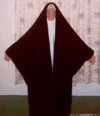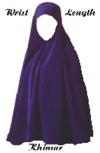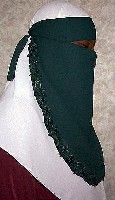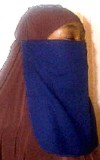
 |
Glossary
Here is a glossary of some terms that are used on this website, for both Muslim and non-Muslim visitors.
| Allah | The One God |
| Awra | The part of a person's body that must be covered before everybody but a spouse; for men this is from navel to knee, for women from upper chest to knee. It may also be used to refer to what must be concealed of a woman before non-related men |
| Ayah | Literally means "sign"; used to refer to a verse of the Quran, each of which is a sign of God. Plural is "ayat" |
| Bid'a | Literally means "innovation"; it refers to adding an obligation to the religion that God and the Prophet Muhammad did not do. Some Muslims feel that adding anything at all to the religion, even if it's not an obligation, is a bid'a |
| Dalil | Evidence that is brought from Quran and Sunna to prove a point. For instance, to make a claim about the status of the face veil, one must present dalils |
| Da'wah | The "call" to Islam; inviting people to learn more about Islam to encourage them to convert |
| Deen | Also spelled "din". The Arabic word for "religion". Carries the sense of a debt that we owe God, and of a code for judging peoples' actions. Thus it means religion as a whole way of life not just as worship practices |
| Du'a | Personal prayer or supplication to God, contrasted with salat (which see), the fixed-time ritual prayer. The name means "calling on God" |
| Eid | Means "festival"; also spelled "`Id". There are two Eids; Eid al-Fitr at the end of Ramadan, and Eid al-Adha at the time of the end of the hajj |
| Fard | Obligatory; performance will be rewarded and neglect will be punished (said of an action) |
| Fatwa | Contrary to popular misconception, a fatwa is not a "death sentence" but is simply an official answer by a scholar to a legal question. One can ask for a fatwa on the status of pepperoni. Plural is "fatawa" |
| Fiqh | The science of jurisprudence or interpreting the Shari'a |
| Hadith | A report about things the Prophet Muhammad said, did, or allowed; the hadiths are a textual source for the Sunna but are not identical to it |
| Hadith Qudsi | A special kind of hadith in which the Prophet Muhammad reports on what God said to him other than the Quran; these are considered to be paraphrases while the Quran is God's literal word |
| Hajj | The pilgrimage to Mecca; one of the five pillars. It is obligatory once in a Muslim's life, if he or she is able to afford it |
| Halal | Lawful; something that is halal may be required, recommended, neutral, or even detestable. It is just that it is not forbidden |
| Hanafi | One of the four madhhabs (which see). Generally considered the most liberal |
| Hanbali | One of the four madhhabs (which see). Generally considered the most conservative |
| Haram | Forbidden; performance will be punished and neglect will be rewarded (said of an action) |
| Hijab | The modest dress of the Muslim woman; the word is sometimes used to refer only to the headscarf. A woman who wears hijab is a hijabi |
| Ihram | The sacred state of the pilgrim on hajj; involves certain restrictions on conduct and certain changes in dress |
| Iman | Faith |
| Inshallah | God willing; if God wills (said when discussing the future) |
| Istikhara | A type of salat; it is offered when a Muslim faces a difficult decision, seeking God's aid |
| Jannah | Paradise; the abode of the righteous in the Hereafter. The Arabic word "Jannah" means "garden" |
| Jihad | Contrary to popular opinion in the West, this does not mean "holy war". A literal translation is "struggle". The struggle to establish justice and righteousness may or may not involve military action. Just as Westerners talk about their "crusade against poverty", so Muslims can use jihad in the same sense. There is also the "greater jihad", which is entirely against the caprices of the soul; the jihad in the world is the "lesser jihad" |
| Jilbab | A long coat or cloak; more generally, any type of outergarment that covers from the shoulders to the ankles. Commanded in Quran Surah al-Ahzab ayah 59 |
| Jinn | One of the created orders, made of smokeless fire. The jinn according to the Quran may choose good or evil. Those who choose evil are referred to as "the satans". They seem to be similar to the evil spirits mentioned in the Talmud and the Gospels. The singular form is properly "jinni" and the English word "genie" seems to be a corruption of this |
| Mabruk | An Arabic term meaning "Congratulations!" or "May you be blessed" |
| Madhhab | A term referring to a legal school in Islam. Each has a slightly different way of engaging in fiqh (which see) |
| Mahram | Someone with whom there can never be marriage because of consanguinity or affinity. For example, a father is a mahram relative for a woman |
| Makruh | Detestable; performance will not be punished, but neglect will be rewarded (said of an action) |
| Maliki | One of the four madhhabs (which see). Generally considered moderately liberal |
| Mashallah | What God has willed (said whenever something good or bad happens) |
| Masjid | The Arabic word from which the English word "mosque" is derived; it means "place of prostration" or more broadly "place of worship". The mosque is just the Muslim place of worship |
| Mubah | Neutral; peformance will not be rewarded and neglect will not be punished (said of an action) |
| Mustahabb | Recommended; performance will be rewarded but neglect is not punished (said of an action) |
| Niqab | The face veil; styles of dress that involve veiling the face. A woman who wears niqab is a niqabi |
| Qiyamah, Day of | The Day of Resurrection; Judgement Day. The Arabic word "qiyamah" carries a sense of it being the day on which everybody is called to stand (before God) |
| Quran | The revealed Scripture of Islam; transmitted word-for-word from God to the Prophet Muhammad via the angel Gabriel |
| (rAa) | An abbreviation for "radi Allahu anhu"; used after the names of the first few generations of Muslims, it means "May God be satisfied with him/her" |
| Ramadan | The month of fasting; one of the five pillars. The fast is from dawn to sunset and involves abstaining from food, drink, and sexual relations (if married) |
| Revert | A person who returns to a religion they previously had; Muslim custom is to apply this term to converts to Islam as well, on the grounds that Islam is the religion that every person was born into, but their parents made them another religion |
| Riba | The practice of charging interest on loans; sometimes translated as "usury". Riba is forbidden under Islamic law, which makes the modern finance system challenging for Muslims |
| (sAas) | An abbreviation for "salli Allahu alayhi wa sallam"; used after the name of the Prophet Muhammad, it means "may the blessings of God and peace be upon him" |
| Sabr | An Arabic word meaning "perseverance" or "patience". The quality of continuing to trust in God even when everything seems to be going wrong. Sabr is one of the qualities that can lead to Paradise. Quran 33:35 mentions "the men who persevere and the women who persevere" as among those who will receive a great reward from God |
| Sahaba | The Companions of the Prophet Muhammad; the singular is "sahabi" and the feminine plural is "sahabiyat" |
| Salaf | A general term for the early generations of Muslims |
| Salat | The fixed-time ritual prayer of Islam and one of the five pillars. It is offered five times a day: at dawn, mid-day, mid-afternoon, sunset, and nightfall |
| Shafi'i | One of the four madhhabs (which see). Generally considered relatively conservative |
| Shahadah | The testimony of faith "Laa ilaha ill'Allah. Muhammadan rasul Allah" that makes a person a Muslim under the law |
| Shari'a | Islamic law; the two sources are the Quran and the Sunna |
| Shaytan | The satan. The English word "satan" is actually adapted from a Hebrew word which means "adversary". The Arabic word "shaytan" is a cognate to this. Satan in Islamic teaching (where he is also named Iblis) is from the race of the jinn (which see) rather than being a fallen angel as in Christian teaching |
| Shirk | The associating of partners with God; usually translated as "polytheism" or "idolatry" |
| Sunna (1) | The deeds, sayings, and silent approvals of the Prophet Muhammad; this consitutes the second source of Shari'a. It is obligatory for Muslims to follow the Sunna as well as the Quran |
| Sunna (2) | Some action taken by the Prophet Muhammad; for instance one of the Prophet's sunnas is to fast three days each month |
| Sunna (3) | Recommended; performance will be rewarded but neglect is not punished (said of an action). This is nearly synonymous with "mustahabb" but carries the sense that the form has specifically been established by the Prophet Muhammad |
| Surah | Refers to the "chapters" of the Quran; there are 114 surahs |
| SWT | An abbreviation for "Subhana wa Ta'ala"; used after God's name, it means "be He glorified and exalted" |
| Tabi'un | The Successors; this refers to the second generation of Muslims, who were succcessors to the Sahaba |
| Tafsir | A commentary on the Quran, explaining the meaning of its verses |
| Tasawwuf | Islamic mysticism; the English term is Sufism |
| Tawhid | Islamic monotheism |
| Ulama | The religious scholars of Islam. The singular is "alim" and the term "mullah" is synonymous. The place of ulama in Islam is similar in many ways to that of rabbis in Judaism |
| Umma | An Arabic word meaning "community" or "nation"; specifically used to refer to the worldwide community of Muslims, as united by faith |
| Ummahat al-Muminin | An Arabic phrase meaning "mothers of the faithful". It is a title given to the wives of the Prophet Muhammad, based on Surah al-Ahzab verse 6 which says "The Prophet is nearer to the faithful than their own souls, and his wives are their mothers" |
| Wudu | The ritual ablutions that precede the salat, which involve washing the hands, mouth, nose, face, forearms, hair, ears, and feet |
| Zakat | One of the five pillars, it involves giving 2.5% of surplus wealth to help the needy |
Here is also a glossary of different names that are given to the dress of the Muslim woman and their various meanings
| Abaya |  | A type of outergarment that covers the head and body; it is all but shapeless |
| Boushiya |  | A veil that is tied on at the forehead and falls to cover the entire face but has no cut-out for the eyes; instead, the fabric is sheer enough to be seen through |
| Buknuk |  | This is similar to Khimar (2) - see below - but comes down just to the bosom. Sometimes called "Amira hijab" if it has embroidery at the edge |
| Burqa (1) |  | A veil that covers the face and entire head but with a place cut out for the eyes |
| Burqa (2) |  | Also known as the Afghan Burqa. Covers the entire body and has a grille over the face that the woman looks through. May have slits for the hands |
| Chador |  | A type of outergarment that covers the head and body; it is sort of like Khimar (2) - see below - but comes down to the ankles or the ground. May have slits for the hands |
| Dupatta |  | Also called "shayla" and "milfeh"; a type of headcovering that is wrapped around the head |
| Hijab (1) |  | The entire modest dress of the Muslim woman |
| Hijab (2) |  | The headscarf; this is properly referred to as a "khimar" |
| Hijab (3) |  | A type of headcovering that is a square of fabric folded into a triangle then placed over the head and fastened under the chin; this is probably the most common style |
| Jilbab (1) |  | The term used in the Quran (Surah al-Ahzab ayah 59) to refer to the outergarment |
| Jilbab (2) |  | A type of outergarment that looks like a long raincoat or trenchcoat |
| Khimar (1) |  | The term used in the Quran (Surah an-Nur ayah 31) to refer to the headscarf; the word "hijab" is more commonly used with this meaning |
| Khimar (2) |  | The word "khimar" is most commonly used to refer to a circular type of headcovering with a hole cut out for the face, which usually comes down to the waist. Note the variations Buknuk and Chador above, which are the same style but different lengths |
| Milfeh |  | See Dupatta |
| Niqab (1) |  | Any type of veil for the face or outfit that covers the face |
| Niqab (2) |  | A veil that is tied on at the forehead and falls to cover the entire face with a place cut out for the eyes. Also called "full niqab" |
| Niqab (3) |  | A veil that is tied on at the bridge of the nose and falls to cover the lower face. Also called "half niqab" |
| Shalwar Kameez |  | An outfit common in Pakistan that involves a very long tunic (at least knee length) and trousers. Also worn by men |
| Shayla |  | See Dupatta |